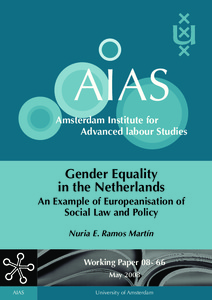Gender equality in the Netherlands : an example of europeanisation of social law and Policy
"The aim of this article is to present a legal analysis of how the legislation and social policies in the field of gender equality in the Netherlands have been influenced by the European integration process. This research is founded on an acknowledgement of the fact that the interaction between...
| Main Author: | |
|---|---|
| Institution: | ETUI-European Trade Union Institute |
| Format: | TEXT |
| Language: | English |
| Published: |
Amsterdam
2008
AIAS |
| Subjects: | |
| Online Access: | https://www.labourline.org/KENTIKA-19188598124919067709-Gender-equality-in-the-Netherl.htm |
| Summary: | "The aim of this article is to present a legal analysis of how the legislation and social policies in the field of gender equality in the Netherlands have been influenced by the European integration process. This research is founded on an acknowledgement of the fact that the interaction between the European Union (UE) and member state levels is a two-way process, and considers the ‘Europeanisation of social policy’ as a cyclical process. In the context of the new EU governance discourse, this case study examines the question whether the use by the EU of different instruments of public intervention in social affairs produces different impacts on social legislation and policy at domestic level. This article focuses on the examination of how the European Community legislation on equal treatment for men and women in employment, occupation and on part-time work has been transposed to the domestic level (‘downloading’ or ‘taking’). In addition, the article addresses the question of whether the Dutch actors have been able to upload their approaches and preferences in the area of gender equality legislation to the EU level (‘uploading’ or ‘shaping’). On the ‘uploading’ perspective of the Europeanisation process, the main conclusion of this case study is that the Dutch have been fairly successful in bringing forward several ideas (i.e., a flexible and pro-active approach to part-time work) to the European social agenda. Concerning the ‘downloading’ dimension of the process, despite noticing some disparities in the conceptual field, the findings achieved show that the EU legislation as regards gender equality has been reasonably well transposed into the Dutch legal framework." |
|---|---|
| Physical Description: | 55 p. Digital |

